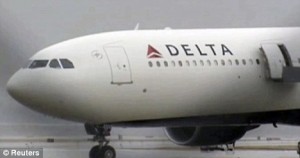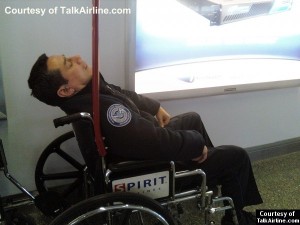
Delta Air Lines Flight 253
It was lucky that the bomb didn’t go off on Delta Airlines Flight 253 by the so-called Christmas bomber. However recent research shows that the Airbus A330 with 278 might have been able to land, if the bomb had detonated.
BBC News did some research with a Boeing 747 that showed that flight 253’s fuselage most likely would not have broken and it should have been able to land safely. The testing shows the bomber, Umar Farouk Abdulmutallab, and the passenger next to him would have most likely been killed, making it still a very horrific event. The explosion would cause injuries to passengers, smoke and chaos, but the plane would have still been able to land completely intact.
Dr John Wyatt, an international terrorism and explosives adviser to the UN, replicated the conditions on board the Detroit flight on a decommissioned Boeing 747 at an aircraft graveyard in Gloucestershire, England. The amount of explosives found on the bomber would not have been enough to break the skin of the flexible aluminum making up the aircraft’s fuselage. Even though the Boeing 747 was not the aircraft that flew on flight 253, the two planes are made similarly enough to be used in the test.
The researchers couldn’t do into great details of the damages that were caused for security reasons, but their goal is to assure passengers that airlines are safer than most people think. For the tests the plane was not pressurized since flight 253 was at about 10,000 feet and the pressure would have been similar on the inside and outside of the fuselage. The results could be much more different at a higher altitude.
If you live in the UK you can watch the full BBC show, otherwise you can check out a small clip of the show here.
connect | web | twitter | facebook |

TSA not up to the job. Check on the Image link below for the story on this picture!
Is the TSA going crazy? Yes! At least in my opinion. I won’t get into how silly it is for me to take off my shoes every time I fly because of something someone tried to do eight years ago. That seems kind of old school now. I think I should talk more about the recent developments.
If you haven’t heard already, on Christmas Day, a man tried to blow up Delta Airlines flight 253 from Amsterdam to Detroit. Long story short (not to down play the incident), the man tried to detonate explosives on the plane that were sewn into his clothes. Luckily, it failed, passengers were able to restrain him, and the Airbus 300 with all 278 people aboard was able to land safely. The man claims al Qaeda connections, but those have not been confirmed.
Yes, someone trying to kill almost 300 people is a HORRID act and should not be glossed over. However, having a bad knee-jerk reaction is not the right move. Homeland Security and TSA announced some pretty crazy rules after this incident. These rules were made just for international flights coming to the US and here are a few of my favorite:
* Passengers were not able to get out of their seats during the last hour of flight. This makes little sense to me. If someone wanted to blow up a plane, it would be easy to do it any other time. Yes, terrorists want to make the biggest scene possible and exploding a plane right before landing, but I doubt this rule would stop someone from blowing up or hi-jacking a plane.
* Disabling of all GPS systems on aircraft. Many international aircraft have in-flight entertainment systems (IFE) with a map showing where the aircraft current location. If an airline cannot disable the GPS separately from the IFE, the whole system must be disabled. That means if you paid more to fly on an airline with a great IFE, you won’t be able to enjoy it. This seems like one of the craziest rules, because: #1 someone could bring a portable GPS system, #2 you can have a basic idea where you are by simple math, #3 just look out the window.
* Passengers are being frisked more. TSA is telling passengers to expect to be patted down at the gate before boarding. On the outside this seems like it might actually help, but the most recent terrorist had the explosives sewed into his clothes. I also don’t appreciate being patted down by some stranger to go visit my family.
Already the TSA is backing down on some of their requirements. TSA is saying that airlines can once again use their IFE and passengers do not need to stay seated during the last hour of the flight. Doesn’t the fact that the TSA is loosening their restrictions show even they realize this was a knee-jerk reaction and doesn’t provide any real security?
It is disappointing that the TSA had over eight years since September 11th to come up with a solid solution, but so far, I am not impressed. How about stopping a guy, who was on the watch list, bought a one-way ticket in cash, had his father call the US embassy to warn his son might do something stupid and has ties to other terrorists, from getting onto a plane? Finding a way to stop people like that from boarding planes seems like a much smarter approach than making me sit during the last hour of the flight and taking away my IFE.
Of course I do not want a plane to be hi-jacked or be blown up, but I am not willing to give up my personal rights, my privacy or have a huge inconvenience for a very, very, very low chance of something happening.
The reality is, if someone wants to blow up a plane, it is not that difficult. Look at this most recent incident; he had so many indicators, but was still able to get onto the plane. There are so many security holes, with a little effort and enough people, this can happen again, even with huge security reforms. I am not going to let this scare me into not flying and I hope it doesn’t stop you.
Here are some other great perspectives on this incident I have enjoyed reading:
* Dan Webb with Things in the Sky
* Brett Snyder with Cranky Flier
* Mary Kirby on her blog and via Twitter
* Steven Frischling with Flying with Fish
* How could this happen? By the NY Times
follow | web | twitter | email | rss |
Image: TalkAirline.com

